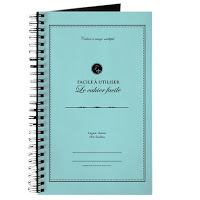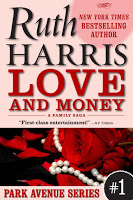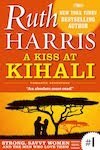Ruth Harris's Blog, page 3
July 1, 2018
My Mom's quick, easy, utterly delicious recipe for old-fashioned blueberry cobbler.
Summer's here. So are blueberries—and Blueberry Cobbler!
 Blueberry Cobbler
Blueberry Cobbler
My Mom was a proud New Englander and an excellent cook. Her recipe for blueberry cobbler is quick, easy and delicious, perfect to share with friends, family or to eat standing up in the kitchen as it comes fresh from the oven!
1 quart blueberries1/2 cup sugar1/2 teaspoon cinnamon
Place in buttered oven-proof casserole.
1/2 cup sugar1 cup sifted flour1 1/2 teaspoon baking powder3 tablespoons butter1/2 cup milk
Combine dry ingredients. Cut in butter until crumbly. Moisten with 1/2 cup milk. Spread over berry mixture and bake in 400 oven for 25-30 minutes until bubbly and lightly browned.
Et voilà!
Enjoy with or without ice cream.Alone or with someone you love.Morning, noon or night. :-)
 Blueberry Cobbler
Blueberry CobblerMy Mom was a proud New Englander and an excellent cook. Her recipe for blueberry cobbler is quick, easy and delicious, perfect to share with friends, family or to eat standing up in the kitchen as it comes fresh from the oven!
1 quart blueberries1/2 cup sugar1/2 teaspoon cinnamon
Place in buttered oven-proof casserole.
1/2 cup sugar1 cup sifted flour1 1/2 teaspoon baking powder3 tablespoons butter1/2 cup milk
Combine dry ingredients. Cut in butter until crumbly. Moisten with 1/2 cup milk. Spread over berry mixture and bake in 400 oven for 25-30 minutes until bubbly and lightly browned.
Et voilà!
Enjoy with or without ice cream.Alone or with someone you love.Morning, noon or night. :-)
Published on July 01, 2018 13:35
May 7, 2018
Looking For A New Book To Read? Great Books, Great First Sentences.

Stephen King has said that he spends “months and years” creating that first line. He goes on to say: “An opening line should invite the reader to begin the story. It should say: Listen. Come in here. You want to know about this.”The question is, how does he accomplish all this in one sentence? From Moby Dick’s “Call me Ishmael” to Charles Dickens’ “It was the best of times, it was the worst of times,” some first sentences have become famous classics. So, too, Jane Austen’s “It is a truth universally acknowledged, that a single man in possession of a good fortune must be in want of a wife.”A deeper look into the breadth of masterful first sentences offers a wide array of the ways writers draw readers into their stories and inspiring examples of how much information can be conveyed in a single sentence.The First Person Introduction.In a memoir or a novel written in the first person, the author puts himself in the mind of the central character and, in one way or another, tells readers that we are about to get the real deal. No BS here, the sentence promises, just the honest, unvarnished truth about someone we want to know more about.Sylvia Plath uses the first sentence of The Bell Jar, to establish the nervous, dark mood that hovers over the character and the story. Her story begins—“It was a queer, sultry summer, the summer they electrocuted the Rosenbergs, and I didn’t know what I was doing in New York.”Plath’s use of the word electrocuted provides an unexpected jolt and mention of the Rosenbergs sets a time (June 1953). Sultry summer sets an uncomfortable season, New York establishes a place, and the final phrase conveys the uncertainty of a young woman struggling to find an identity and a place in life.Vladimir Nabokov uses the first nine words of Lolita to convey the note of obsessive erotic desire that pulses through the entire novel.“Lolita, light of my life, fire of my loins.”Nabokov begins by naming the object of his passion, the word light expresses her transformative influence on the narrator, the word loins promises that we will be reading a story about sex, and the repetition of the letter l creates the feeling of an incantation.In Ghostwriters In The Sky, Book 1 of The Camilla Randall Mysteries, Anne uses her first sentence to introduce the MC, locate the place (the subway can only mean NYC), and refer to the season (sweaty indicates hot, most likely summer). [Currently on sale for 99c]“The subway car was so crowded I couldn’t tell which one of the sweaty men pressing against me was attached to the hand now creeping up my thigh.”The phrase “creeping up my thigh” indicates a level of unwanted personal attention which places the character in an uncomfortable, if rather ludicrous situation—a theme that will be repeated in different variations throughout the novel.In Catcher In the Rye, J.D. Salinger uses an effective but contradictory combination of bravado and vulnerability to establish a unique voice as he introduces us to preppy Holden Caulfield.“If you really want to hear about it, the first thing you’ll probably want to know is where I was born, and what my lousy childhood was like, and how my parents were occupied and all before they had me, and all that David Copperfield kind of crap, but I don’t feel like going into it, if you want to know the truth. We read on because Salinger’s confessional tone makes us want to know more about his lousy childhood and find out why he doesn’t feel like going into it.The Third Person Introduction.In Goldfinger, Ian Fleming introduces 007 in the first sentence.“James Bond, with two double bourbons inside him, sat in the final departure lounge of Miami airport and thought about life and death.”Fleming has told us in only a few words that his MC is a drinking man, one who travels, and one who contemplates the larger questions of existence. Where, we wonder, is Bond going, what is he going to do once he gets there, and why does he need to down two double bourbons before he boards his flight?In The Hobbit, JRR Tolkien simply tells us where his MC lives, but in such a startling way that we feel compelled to read on.“In a hole in the ground there lived a hobbit.”A hobbit? A story about a creature who lives in a hole? Who or what is this hobbit and why does he live in a hole. Curious, we read on.I introduce heiress, DeeDee Dahlen, the MC in Love And Money, Book 1 of the Park Avenue Series with a brief, declarative sentence.“Her name was DeeDee Dahlen and she was famous from the day she was born.”How can a newly-born infant be famous?, the reader wonders. What rewards—and penalties—does unasked-for celebrity impose? What secrets and scandal will shadow her future?—urgent questions that will reverberate throughout the entire novel. [Love And Money is now FREE at Amazon, Nook, iBooks, GooglePlay and Kobo.]Graham Greene, in Brighton Rock, compels us to want to know more.“Hale knew, before he had been in Brighton three hours, that they meant to murder him.”Who are the ‘they?’ we wonder. And what has Hale done? Why do ‘they’ want to kill him?Gabriel Garcia Marquez begins One Hundred Years of Solitude with this famous sentence—“Many years later, as he faced the firing squad, Colonel Aureliano Buendia was to remember that distant afternoon when his father took him to discover ice.”The author uses a shocking situation—a man facing a firing squad—plus a long-ago memory to pique our curiosity. Who is the Colonel and what had he done that he ends up facing a firing squad? What was there about the discovery of ice that it has lodged so forcefully in his memory? Compelling questions to which we must find the answer and, thus, we continue to read.A Theme.Whether classic literature, hard-boiled pulp fiction, or cyberpunk scifi, the first sentence establishes a theme that will continue throughout the story. If the book does not follow through on the promise of that first sentence, the disappointed reader will feel cheated.In his first sentence, Leo Tolstoy in Anna Karenina tells us that we are about to read a story about an unhappy family.“All happy families are alike; each unhappy family is unhappy in its own way.”Why, we ask ourselves, are they unhappy? What has happened to them and what will they do? Powerful questions the reader wants answered.James Matthew Barrie establishes the theme of Peter Pan with a brief, declarative statement.“All children, except one, grow up.”Which child, we wonder. Why not? And what will happen to a child who doesn’t grow up?A far different theme is set by Franz Kafka in his posthumously published 1925 novel, The Trial.Someone must have slandered Josef K., for one morning, without having done anything truly wrong, he was arrested.Kafka’s first sentence thrusts us immediately into the MC’s waking nightmare of terror and paranoia that will be sustained throughout the story.William Gibson’s Neuromancer was the first novel to win the Nebula Award, the Philip K. Dick Award, and the Hugo Award. The chilling first sentence, said to have been written at the last minute, sets the novel’s theme of a burnt-out computer hacker adrift in a dystopian near future governed by artificial intelligence.“The sky above the port was the color of television, tuned to a dead channel.”Hunter S Thompson, starts his novel, Fear and Loathing in Las Vegas, by establishing a place, a mood, and a theme (a disenchanted retrospective look at the 1960s) in the first sentence.“We were somewhere around Barstow on the edge of the desert when the drugs began to take hold.”A Tease, a Shock, a Jolt.A skillfully written first sentence containing a tease, a shock or a jolt can introduce a character, establish a tone or a setting, and dare the reader not to continue.The first sentence of Nineteen Eighty-Four, George Orwell’s dystopian novel, often considered one of the best one hundred books of the 20th Century, tells us immediately that something—time itself—is awry in a future world of Big Brother, doublethink and government surveillance.“It was a bright cold day in April, and the clocks were striking thirteen.”Joe Konrath pulls us right into the action in the first sentence of his mystery thriller, Dirty Martini, Book 4 of the Jacqueline “Jack” Daniels Mystery series.“No security cameras this time, but he still has to be careful.”What is he doing, we wonder? In his first sentence, Konrath lets us know that whatever it is, it’s something he’s done before. Something risky, perhaps dangerous, and, even though experienced, he still has to be careful. Of what? Of whom?In his legal thriller, The Firm, John Grisham uses his first sentence to tell us that this unnamed and mysterious senior partner will indeed find something to dislike about Mitchell Y. McDeere who, the word résumé indicates, is being considered for a job.“The senior partner studied the résumé for the hundredth time and again found nothing he disliked about Mitchell Y. McDeere, at least not on paper.”What kind of job, we wonder, and what will the senior partner find to dislike? Grisham’s tease promises evil doings and the reader is lured on.In L.A. Confidential, James Ellroy’s first sentence introduces a main character, sets a theme, and tells us exactly what we are about to read. Ellroy uses a knowledgable tone and vernacular language to let us know that he knows what he’s talking about.“An abandoned auto court in the San Berdoo foothills; Buzz Meeks checked in with ninety-four thousand dollars, eighteen pounds of high-grade heroin, a 10-gauge pump, a .38 special, a .45 automatic, and a switchblade he’d bought off a pachuco at the border—right before he spotted the car parked across the line: Mickey Cohen goons in an LAPD unmarked, Tijuana cops standing by to bootsack his goodies, dump his body in the San Ysidro River.”Dennis Lehane, in his short story, Until Gwen pulls us in with the use of the second person combined with the promise of drugs and sex.“Your father picks you up from prison in a stolen Dodge Neon, with an 8-ball of coke in the glove compartment and a hooker named Mandy in the back seat.”The Rule Breakers.Although writers are often cautioned about starting a book with a character’s dream, that rule was effectively broken in the classic first sentence of Daphne DuMaurier’s famous gothic mystery, Rebecca.“Last night I dreamt I went to Manderley again.”Marie Force begins her Gansett Island romance, Meant For Love, with a reference to a dream.“The dream was always the same, the last perfect moment before life as Jenny Wilks knew it changed forever.”Both dreams refer to emotionally significant aspects of the characters’ pasts. The reader wonders why the unidentified first-person narrator of Rebecca dreams of a place and Jenny Wilks of a “perfect” life now gone forever. The authors use dreams to provoke interest in their characters and in the events of the story to come.The passive tense is usually considered to be another no-no. Charles McCarry, in The Tears Of Autumn, considered to be one of the best espionage thrillers of the 20th Century, uses the passive tense to introduce American intelligence officer, Paul Christopher, who is investigating the assassination of John F. Kennedy.“Paul Christopher had been loved by two women who could not understand why he had stopped writing poetry.”McCarry’s elegant use of the passive tense to introduce his MC sets the theme of the book: an exploration of glittering promise that results in the wreckage of unintended consequences—the end of poetry and the end of Camelot.Whether you're looking for a thriller or a romance, whether you want to revisit a classic you read years ago or one you've never quite caught up with, I hope this buffet of great first lines will help you find your next great read. :-)
Published on May 07, 2018 11:09
April 5, 2018
Writing and The Secret Power Of The Subconscious: Summoning Your Muse
 Your Inner Mind Getting To Know Your Muse“What The Subconscious is to every other man, in its creative aspect becomes, for writers, The Muse.” ~ Ray BradburyWhat Ray Bradbury called the muse, Stephen King called the “guys in the basement.” Others call it the sixth sense, the Spidey sense, intuition, superpower, or the subconscious. Sometimes I call it the Inner Mind. Whatever you call it, your subconscious—the thoughts you don’t know you’re thinking—is what makes the magic happen.These unknown thoughts occur below the level of our ordinary, everyday awareness. They consist of our memories and experiences—all the interesting, offbeat, repellent, lurid, provocative, seductive, and enlightening content that rushes past in a torrent every day. This rich mixture of the half-forgotten, barely remembered, and even repressed is original and unique to each one of us, as individual as fingerprints.These unrecognized thoughts announce themselves in different ways and at different times. Sometimes while we’re in the shower, on the highway, in a class, in a dream or fantasy or a nightmare. Often during those drowsy moments when we’re just about to fall asleep or when we first wake up, relaxed, our minds still unguarded.Sometimes these buried thoughts shout. Sometimes they whisper. They leave clues everywhere, tapping us on the shoulder or bopping us on the nose just to make sure we’re paying attention. They speak in different languages and like Joseph Campbell’s hero, they appear to us disguised by a thousand faces, some foreign, some familiar.Signs Of The MuseThe story you can’t get out of your mind.It’s the one that wakes you up at night and intrudes when you really should be paying attention at that meeting or getting that boring report finished.The chapter you’re bogged down on and hate writing.Pay attention. Is your subconscious sending up a warning and telling you you’re on the wrong track? Do you need to go back and figure out where you’ve strayed?The character who says or does something so amazing, awful or awesome that s/he surprises you.Even though you created him or her, you’re appalled, impressed and/or intimidated.The dazzling plot twist you never saw coming.Even though you yourself planted the trail of clues that made it inevitable (and obvious) but only in retrospect. Where did that come from? How or when did you do it? You were the pilot but your muse was the engine.The “perfect” word pops into your mind from “out of nowhere.”Or the phrase you didn’t plan gets you past the cliché and you realize that you are beginning to develop a style of your own.The minor character waiting at the bus stop.The guy with the green umbrella you stuck in without thinking, but who turns out to be exactly the culprit/lover/villain/hero/heroine you need 150 pages later.When you throw away the outline.Because what your characters say or do when you actually start to write about them are a thousand times better and more interesting than you ever imagined.The dazzling idea that flashes through your mind so fast it almost disappears the moment it becomes conscious.That’s a whisper. Better write it down! You might think you’ll remember, but you probably won’t.Like Hansel and Gretel’s breadcrumbs, you mark a trail through the forest.Not really thinking, you leave them as you write—the red-haired tap dancer who lives upstairs, the elegant, panelled room in an ordinary suburban tract house, the half-heard whisper at intermission in the theater. They’re the unexpected inspirations that can come back later and help create a great story.The days you are “in the zone.”When writing feels effortless and the words pour out as fast as you can get them down, you have lowered the gates and allowed your muse to range free.When your Muse has Gone AWOLThis is when you can’t get out of your own way.Have you been feeling hurried, harried or harassed? Overwhelmed, out of control and stressed out? Are you stuck? Or blocked? Or just in a rut? Feel frustrated and about to give up?Don’t. Don’t give up and don’t give in. Shake up your routine.Synch your work habits with those of your muse.Your muse will not react well when you are tired, short of sleep or just dragging through the week. Some muses work better in the morning, others perform at their best later in the day or at night. Don’t expect your night owl muse to be perky and creative early in the AM and don’t ask your crack-of-dawn muse to come to your rescue at midnight.Give your muse a break.Try a yoga class, take some time out for meditation or a massage, unload the dishwasher, mow the lawn, or simply get up and take a walk. Getting away from what’s bugging you will calm you and let the ideas or words you need bubble to the surface.Inspire your muse.Gallery hopping, brushing up your high school Spanish, taking a barre class, enjoying hot dogs and a beer in bleacher seats—each experience offers your muse new and invigorating experience.A summer vacation at the shore might inspire the next Jaws. With toxic-spewing robots?A visit to a natural history museum might result in Jurassic Park.With dragons?An hour or two with the food channel might inspire a new cozy set in a bakery or a political conspiracy among the waiters in a restaurant. Or what about a new horror novel starring a demented, knife-wielding chef, TV cooking-show host or obnoxious restaurant owner?Even the supermarket can inspire your muse—think of The Stepford Wives. Visit Whole Foods for the organic, more upscale version.Binge viewing The Sopranos or House of Cards could lead you to create the next Godfather or All The President’s Men.The business pages are a source for occupations and careers: your characters have to make a living, don’t they? The tabs are an endless wellspring of sex and scandal and niche magazines or blogs—bass fishing, rock climbing, stamp collecting, arctic biology—will open new dictionaries for the alert writer and his or her muse.Sports: for success and failure, triumph and tragedy, go to the sports pages. Seriously. Almost every story is basically about how an athlete, talented or otherwise, overcomes—or doesn’t—golden-boy good looks, a reputation for dogging it, a lousy attitude in the clubhouse, jail time, drugs, booze, injury, scandal, depression, poor parenting, mean and/or incompetent coaching. Besides, it’s not just the drama and the schmaltz, it’s also about the language: sports are all about action and sports writers are great with verbs.Focusing on details can open up the subconsciousStilettos or clogs? Polos or Tees? Grunge or business casual? Black tie or white shoe? Fashion magazines, style blogs and catalogs are filled with photos and enticing descriptions of clothing. Check them out and your muse will find new ways for you to describe your character’s clothing and wardrobe in ways that brings them alive and makes them real to the reader.A Regency drawing room or a Victorian parlor? A cave house in Santorini, a terrorists’ cave in Tora Bora, or a man cave in an Atlanta suburb? A Park Avenue penthouse or a shack on the wrong side of the tracks, a snug farm house or a hideaway on a wild coast? Travel, design and architectural blogs offer a variety of settings that will energize your scenes and help bring your characters to life.Good hair day or bad plastic surgery? Muffin top or too rich and too thin? Beauty and grooming sites are filled with photos and comment, some of it snarky, some of it sincere, about exactly one subject: how people look. With their help, you and your muse can turn your descriptions from insipid to inspired.Trust your muse.Even when you don’t know exactly why and even when you think s/he has abandoned you.Your subconscious a.k.a. your muse knows more than you do. It’s what gives you that eerie, mysterious sense of knowing without knowing.Steve Jobs called it “more powerful than intellect.”Isabel Allende counsels:“Show up, show up, show up, and after a while the muse shows up, too.”Stephen King in On Writing: A Memoir of the Craft said the same thing in more words:“Don’t wait for the muse. As I’ve said, he’s a hardheaded guy who’s not susceptible to a lot of creative fluttering. This isn’t the Ouija board or the spirit-world we’re talking about here, but just another job like laying pipe or driving long-haul trucks. Your job is to make sure the muse knows where you’re going to be every day from nine ’til noon. or seven ’til three. If he does know, I assure you that sooner or later he’ll start showing up.”What about you, scriveners? What do you do to get that magic flowing? Has your muse ever gone AWOL? What surprising magic has your muse brought to you?(This post originally appeared at Anne R. Allen's blog.
Your Inner Mind Getting To Know Your Muse“What The Subconscious is to every other man, in its creative aspect becomes, for writers, The Muse.” ~ Ray BradburyWhat Ray Bradbury called the muse, Stephen King called the “guys in the basement.” Others call it the sixth sense, the Spidey sense, intuition, superpower, or the subconscious. Sometimes I call it the Inner Mind. Whatever you call it, your subconscious—the thoughts you don’t know you’re thinking—is what makes the magic happen.These unknown thoughts occur below the level of our ordinary, everyday awareness. They consist of our memories and experiences—all the interesting, offbeat, repellent, lurid, provocative, seductive, and enlightening content that rushes past in a torrent every day. This rich mixture of the half-forgotten, barely remembered, and even repressed is original and unique to each one of us, as individual as fingerprints.These unrecognized thoughts announce themselves in different ways and at different times. Sometimes while we’re in the shower, on the highway, in a class, in a dream or fantasy or a nightmare. Often during those drowsy moments when we’re just about to fall asleep or when we first wake up, relaxed, our minds still unguarded.Sometimes these buried thoughts shout. Sometimes they whisper. They leave clues everywhere, tapping us on the shoulder or bopping us on the nose just to make sure we’re paying attention. They speak in different languages and like Joseph Campbell’s hero, they appear to us disguised by a thousand faces, some foreign, some familiar.Signs Of The MuseThe story you can’t get out of your mind.It’s the one that wakes you up at night and intrudes when you really should be paying attention at that meeting or getting that boring report finished.The chapter you’re bogged down on and hate writing.Pay attention. Is your subconscious sending up a warning and telling you you’re on the wrong track? Do you need to go back and figure out where you’ve strayed?The character who says or does something so amazing, awful or awesome that s/he surprises you.Even though you created him or her, you’re appalled, impressed and/or intimidated.The dazzling plot twist you never saw coming.Even though you yourself planted the trail of clues that made it inevitable (and obvious) but only in retrospect. Where did that come from? How or when did you do it? You were the pilot but your muse was the engine.The “perfect” word pops into your mind from “out of nowhere.”Or the phrase you didn’t plan gets you past the cliché and you realize that you are beginning to develop a style of your own.The minor character waiting at the bus stop.The guy with the green umbrella you stuck in without thinking, but who turns out to be exactly the culprit/lover/villain/hero/heroine you need 150 pages later.When you throw away the outline.Because what your characters say or do when you actually start to write about them are a thousand times better and more interesting than you ever imagined.The dazzling idea that flashes through your mind so fast it almost disappears the moment it becomes conscious.That’s a whisper. Better write it down! You might think you’ll remember, but you probably won’t.Like Hansel and Gretel’s breadcrumbs, you mark a trail through the forest.Not really thinking, you leave them as you write—the red-haired tap dancer who lives upstairs, the elegant, panelled room in an ordinary suburban tract house, the half-heard whisper at intermission in the theater. They’re the unexpected inspirations that can come back later and help create a great story.The days you are “in the zone.”When writing feels effortless and the words pour out as fast as you can get them down, you have lowered the gates and allowed your muse to range free.When your Muse has Gone AWOLThis is when you can’t get out of your own way.Have you been feeling hurried, harried or harassed? Overwhelmed, out of control and stressed out? Are you stuck? Or blocked? Or just in a rut? Feel frustrated and about to give up?Don’t. Don’t give up and don’t give in. Shake up your routine.Synch your work habits with those of your muse.Your muse will not react well when you are tired, short of sleep or just dragging through the week. Some muses work better in the morning, others perform at their best later in the day or at night. Don’t expect your night owl muse to be perky and creative early in the AM and don’t ask your crack-of-dawn muse to come to your rescue at midnight.Give your muse a break.Try a yoga class, take some time out for meditation or a massage, unload the dishwasher, mow the lawn, or simply get up and take a walk. Getting away from what’s bugging you will calm you and let the ideas or words you need bubble to the surface.Inspire your muse.Gallery hopping, brushing up your high school Spanish, taking a barre class, enjoying hot dogs and a beer in bleacher seats—each experience offers your muse new and invigorating experience.A summer vacation at the shore might inspire the next Jaws. With toxic-spewing robots?A visit to a natural history museum might result in Jurassic Park.With dragons?An hour or two with the food channel might inspire a new cozy set in a bakery or a political conspiracy among the waiters in a restaurant. Or what about a new horror novel starring a demented, knife-wielding chef, TV cooking-show host or obnoxious restaurant owner?Even the supermarket can inspire your muse—think of The Stepford Wives. Visit Whole Foods for the organic, more upscale version.Binge viewing The Sopranos or House of Cards could lead you to create the next Godfather or All The President’s Men.The business pages are a source for occupations and careers: your characters have to make a living, don’t they? The tabs are an endless wellspring of sex and scandal and niche magazines or blogs—bass fishing, rock climbing, stamp collecting, arctic biology—will open new dictionaries for the alert writer and his or her muse.Sports: for success and failure, triumph and tragedy, go to the sports pages. Seriously. Almost every story is basically about how an athlete, talented or otherwise, overcomes—or doesn’t—golden-boy good looks, a reputation for dogging it, a lousy attitude in the clubhouse, jail time, drugs, booze, injury, scandal, depression, poor parenting, mean and/or incompetent coaching. Besides, it’s not just the drama and the schmaltz, it’s also about the language: sports are all about action and sports writers are great with verbs.Focusing on details can open up the subconsciousStilettos or clogs? Polos or Tees? Grunge or business casual? Black tie or white shoe? Fashion magazines, style blogs and catalogs are filled with photos and enticing descriptions of clothing. Check them out and your muse will find new ways for you to describe your character’s clothing and wardrobe in ways that brings them alive and makes them real to the reader.A Regency drawing room or a Victorian parlor? A cave house in Santorini, a terrorists’ cave in Tora Bora, or a man cave in an Atlanta suburb? A Park Avenue penthouse or a shack on the wrong side of the tracks, a snug farm house or a hideaway on a wild coast? Travel, design and architectural blogs offer a variety of settings that will energize your scenes and help bring your characters to life.Good hair day or bad plastic surgery? Muffin top or too rich and too thin? Beauty and grooming sites are filled with photos and comment, some of it snarky, some of it sincere, about exactly one subject: how people look. With their help, you and your muse can turn your descriptions from insipid to inspired.Trust your muse.Even when you don’t know exactly why and even when you think s/he has abandoned you.Your subconscious a.k.a. your muse knows more than you do. It’s what gives you that eerie, mysterious sense of knowing without knowing.Steve Jobs called it “more powerful than intellect.”Isabel Allende counsels:“Show up, show up, show up, and after a while the muse shows up, too.”Stephen King in On Writing: A Memoir of the Craft said the same thing in more words:“Don’t wait for the muse. As I’ve said, he’s a hardheaded guy who’s not susceptible to a lot of creative fluttering. This isn’t the Ouija board or the spirit-world we’re talking about here, but just another job like laying pipe or driving long-haul trucks. Your job is to make sure the muse knows where you’re going to be every day from nine ’til noon. or seven ’til three. If he does know, I assure you that sooner or later he’ll start showing up.”What about you, scriveners? What do you do to get that magic flowing? Has your muse ever gone AWOL? What surprising magic has your muse brought to you?(This post originally appeared at Anne R. Allen's blog.
Published on April 05, 2018 14:19
March 8, 2018
Plot Holes And Pot Holes: 8 Common Mistakes Readers Hate—And How To Fix Them
 Beware plot and pot holes in your fiction! We all come face to face with them, those pesky glitches, oopsies, OMGs and WTFs that ruin a story, turn a reader off, guarantee a slew of one-star reviews—and kill sales.Beta readers will often point them out. Editors are professional fixers, always on the lookout for booboos. You will realize them yourself when you wake up at 3AM sudden realizing that the MC’s beloved pet who started out as a friendly, tail-wagging Golden Retriever, has somehow become a snarling, saber-toothed attack dog.These unforced errors range from plot holes, small and economy-size, to lapses in logic. They also include poorly conceived characters, blah settings, pointless dialogue, and momentum-killing info dumps. Even a few will make your book—and you—look like a loser on amateur night.You need to find them—and fix them—before readers do.1. Lapses in logic.Your MC is stranded on a dry planet in a far galaxy but when the villain suddenly appears bent on revenge and brandishing a nuclear ray gun, said villain falls into a deep puddle and drowns.Your cute, adorable if somewhat ditzy heroine is a lousy, horrible, terrible cook. The reader falls in love with her—until she cooks a four course gourmet dinner for her hunky new boyfriend.Your MC has just broken her leg and is lying helpless in the middle of the road waiting for an ambulance but suddenly gets up and kicks the you-know-what out of her antoganist. Uh. Really?“&$#%!!?” thinks your reader as s/he throws your book across the room.The fix.In cases like this, the lapse is the result of inadvertantly omitting the necessary set up. Go back several scenes and let your reader know that—The dry planet in a far galaxy experienced a once-in-a-century-torrential rainstorm. Residual puddles, deep and dangerous, lurk and your villain, who we now know is color blind, thanks to your new, artful set up, does not see the beautiful, shimmering but deep and dangerous turquoise blue water.Oh, and did Ms. Ditzy, win a course with Monsieur Master Chef in a cute and adorable contest? If you go back and insert such a scene, why, yes, of course she did. Got at A , too!Your MC thinks quickly and, despite being in excruciating pain, fashions a splint out of a nearby fallen branch, thus allowing him or her to get up and kick the bleep out of the antagonist. That is one MC not to be messed with!2. Mean girls (and boys).Your heroine, Sally, is madly in love but falls even mad-lier in love when a handsomer, richer, sexier, guy comes along and catches her eye (plus other parts of her anatomy).Could be the basis of a suspenseful/comic/sad situation, but if bf #1 is never mentioned again, if Sally never gives him another thought, or never has even a transient moment of regret or what-if, you’ve got a heroine so self-centered and maybe even narcissistic that no reader can relate.Not just girls, either. Just read the headlines to find plenty of examples of guys who are far less than stellar. You really expect a reader to stay with this kind of guy for very long? Their wives divorce them, their girl friends dump them and so should you.The fix.Check your characters for basic decency or, in extreme cases, mental health, but don’t forget that even villains must have a redeeming quality.3. Info dumps.Blah,blah, blah. And then this happened and after a while that happened. Blah,blah, blah. Then they went from here to there and that’s why blah blah blah.Info dumps stop the plot in its tracks. They are boring to read and, in fact, boring to write. Readers hate them and writers should, too.You should be on info dump alert whenever you review your manuscript and see long, dense grey blocks of text or lengthy paragraphs of narrative. You should also pay attention whenever you bore yourself writing. Trust me, it happens. [image error]
Beware plot and pot holes in your fiction! We all come face to face with them, those pesky glitches, oopsies, OMGs and WTFs that ruin a story, turn a reader off, guarantee a slew of one-star reviews—and kill sales.Beta readers will often point them out. Editors are professional fixers, always on the lookout for booboos. You will realize them yourself when you wake up at 3AM sudden realizing that the MC’s beloved pet who started out as a friendly, tail-wagging Golden Retriever, has somehow become a snarling, saber-toothed attack dog.These unforced errors range from plot holes, small and economy-size, to lapses in logic. They also include poorly conceived characters, blah settings, pointless dialogue, and momentum-killing info dumps. Even a few will make your book—and you—look like a loser on amateur night.You need to find them—and fix them—before readers do.1. Lapses in logic.Your MC is stranded on a dry planet in a far galaxy but when the villain suddenly appears bent on revenge and brandishing a nuclear ray gun, said villain falls into a deep puddle and drowns.Your cute, adorable if somewhat ditzy heroine is a lousy, horrible, terrible cook. The reader falls in love with her—until she cooks a four course gourmet dinner for her hunky new boyfriend.Your MC has just broken her leg and is lying helpless in the middle of the road waiting for an ambulance but suddenly gets up and kicks the you-know-what out of her antoganist. Uh. Really?“&$#%!!?” thinks your reader as s/he throws your book across the room.The fix.In cases like this, the lapse is the result of inadvertantly omitting the necessary set up. Go back several scenes and let your reader know that—The dry planet in a far galaxy experienced a once-in-a-century-torrential rainstorm. Residual puddles, deep and dangerous, lurk and your villain, who we now know is color blind, thanks to your new, artful set up, does not see the beautiful, shimmering but deep and dangerous turquoise blue water.Oh, and did Ms. Ditzy, win a course with Monsieur Master Chef in a cute and adorable contest? If you go back and insert such a scene, why, yes, of course she did. Got at A , too!Your MC thinks quickly and, despite being in excruciating pain, fashions a splint out of a nearby fallen branch, thus allowing him or her to get up and kick the bleep out of the antagonist. That is one MC not to be messed with!2. Mean girls (and boys).Your heroine, Sally, is madly in love but falls even mad-lier in love when a handsomer, richer, sexier, guy comes along and catches her eye (plus other parts of her anatomy).Could be the basis of a suspenseful/comic/sad situation, but if bf #1 is never mentioned again, if Sally never gives him another thought, or never has even a transient moment of regret or what-if, you’ve got a heroine so self-centered and maybe even narcissistic that no reader can relate.Not just girls, either. Just read the headlines to find plenty of examples of guys who are far less than stellar. You really expect a reader to stay with this kind of guy for very long? Their wives divorce them, their girl friends dump them and so should you.The fix.Check your characters for basic decency or, in extreme cases, mental health, but don’t forget that even villains must have a redeeming quality.3. Info dumps.Blah,blah, blah. And then this happened and after a while that happened. Blah,blah, blah. Then they went from here to there and that’s why blah blah blah.Info dumps stop the plot in its tracks. They are boring to read and, in fact, boring to write. Readers hate them and writers should, too.You should be on info dump alert whenever you review your manuscript and see long, dense grey blocks of text or lengthy paragraphs of narrative. You should also pay attention whenever you bore yourself writing. Trust me, it happens. [image error]
Published on March 08, 2018 11:05
February 7, 2018
9 Powerful Secrets Readers Crave—And Writers Must Know

SECRETS!
Shhh!Secrets.Everyone has them.Every book must have at least one because secrets are the jet-powered engine that propels fiction forward. Ever notice how many blurbs in the daily BookBub email include the word secret?Secrets provide motivation, plot, character, even a setting (a haunted house, anyone?). From Madame Bovary to Carrie, from Rebecca to Big Little Lies, from thrillers to romance, from mystery to women’s fiction to sci-fi, every story revolves around a secret.Secrets ripple outward and can produce unexpected consequences a writer can take advantage of. Because secrets need to be protected, denied, defended, excused, they will have predictable (and unforeseen) consequences on the people who guard them, excuse them, or wilfully blind themselves to their existence.People with secrets are good at keeping them—until they’re not—or else until some external event spills the beans. For example: a nuclear leak from a secret underground testing site that becomes a global headline. The slip up—the “tell”—will then become a major turning point in a novel.In fiction, secrets must be revealed, and the tension secrets create must be resolved. As you plot, plan or pants your book, you will find that a well-chosen secret will provide you with a focus that will energize your writing—and your book.
1. Secrets With A Silver LiningSilver lining secrets can work well in romance or cozy mysteries.What if someone finds out that the Famous TV Chef thinks the local greasy spoon makes better french fries than the ones FTC makes in her fancy, custom-designed, multimillion-dollar kitchen?Might be embarrassing, but won’t kill anyone unless someone adds poison (which could work in a thriller or mystery). Might not even necessarily end the FTC’s career. With shrewd PR, the Greasy Spoon Affair could make that chef even more famous. As long as the FTC doesn’t serve Greasy Spoon fries for $35 a pop in her pricey restaurant and pass them off as his/her own—in which case fraud might be alleged and costly lawsuits might ensue.When a cute, sexy lawyer might appear to make all the bad stuff disappear and provide a HEA for our beleaguered heroine. ;-)
2. State secretsState Secrets are the meat and bones of thrillers from Eric Ambler and John Buchan to Charles McCarry, Ian Fleming and John Le Carré. The plots of spy novels revolve around characters adept at uncovering secrets, keeping secrets, stealing secrets and, in The Manchurian Candidate by Richard Condon, secretly transformed by brainwashing into a deadly weapon—a sleeper assassin, programmed to kill without question or mercy.The cast of characters holding state secrets also include—The spy who can’t be trusted: the treacherous double agent.The scientist—mad or otherwise—who has created—by accident or on purpose—the formula for a new, population-decimating chemical weapon.A powerful world leader—a paragon of enlightened leadership or a Stalin-esque dictator—suffering from a fatal disease or destructive neurological condition that must be concealed—or else!An secret international conspiracy—ever hear of a well-publicized conspiracy?—whose goal is world domination.A top-secret assassination plot that must be uncovered and then stopped.A fatherly-looking but secretly demented, power-crazed lunatic who threatens the stability of international financial markets and, thus, world peace itself.
3. Secret babyA classic trope, the secret baby often—but not always—occurs as a romance sub genre. To mention only a few, there are SEAL’s Secret Babies, Vampire Secret Babies, and Billionaire’s Secret Babies. You will find lists of secret baby romance novels at FictionDB, at GoodReads and at SmartBitchesTrashyBooks.In Love And Money , mainstream women’s fiction published in hard cover by Random House, the mistress and the wife of a wealthy man deliver babies at almost the same time. The half-sisters, who do not know of each other’s existence, grow up in different worlds, one a beautiful, indulged heiress, the other a wrong-side-of-the-tracks neglected child, a dramatic disparity that allowed me to write about class, envy, privilege, resentment and ambition.
4. Family secretsFamily secrets take a starring role in sagas and women’s fiction—and in memoirs.An upstanding citizen who is in reality a deadbeat dad who might—or might not—reconcile with his children.A PTA shining star but secretly neglectful mom who might—or might not—see the error of her ways.The sibling who stealthily cheats his brother/sister out of his/her inheritanceThe rich/powerful/vindictive/creepy relative no one wants to cross.A family fortune created through hard work and persistence—or was it?The alcoholic/mentally ill relative whose erratic, unpredictable behavior affects several generations.An accidental death that wasn’t so “accidental”The BookBub blurb for Alan Cumming’s #1 New York Times bestselling memoir, Not My Father’s Son, refers to “the family secrets that shaped him.”
5. Dark secretsThese are the secrets that form the spine of mysteries.Who-dun-it?Why’d-they-do-it?How’d they do it?How can the MC track down the bad guy or gal?When someone shoots aging bad-girl rocker Morgan Le Fay and threatens to finish the job in Anne’s The Lady of the Lakewood Diner , people assume the perp’s a fan of Morgan’s legendary dead rock-god husband. However, the real reason for the attack may be a secret buried in Morgan's hometown where her childhood best friend may be the only person who knows the dark secret that can save Morgan's life. Anne uses that one secret to propel the plot forward throughout the book.
6. Open SecretsOpen secrets are the emperor-has-no-clothes, Harvey Weinstein, Jerry Sandusky, women’s gymnastics’ category of secrets. These are the secrets that can be used to ensnare numerous connected characters who might or might not be related.Open secrets create a Potemkin Village faux reality in which characters who need to protect themselves from exposure—and consequences—pretend not to know what they actually do know. Lost in a web of confusion, deceit, evasion and denial, these characters are forced by circumstances over which they have no control to become liars, hypocrites, and classic unreliable narrators.“Everyone knows” but no one says anything—until someone does—at which point your plot attains jet speed velocity.Open secrets can be played for drama—or even for humor.The Big Boss is a predatory sexual abuser so people who must work with or for him keep their distance, whisper warnings to others, know better than to share an elevator or after-work drink with him, go to great lengths to make sure they are never trapped alone in his office/hotel room with him.No one admits that Uncle Jim is an incompetent screw-up who can’t keep a job. However, when he wears a suit and tie, he looks like he belongs in a boardroom—until he insults a powerful CEO. At which point, the company’s stock takes off and everyone gets rich by mistake and Uncle Jim is forced to straighten up and fly right.Aunt Susie has a shoplifting problem but the family pays off stores to keep her out of jail and her “problem” is never mentioned—until she lifts a hundred-thousand dollar diamond ring and, this time, the family can’t afford to pay and all hell breaks loose.Cousin Bill, captain of the football team, has tried suicide several times, but the family refuses to admit/confront his mental health issues—until he is photographed pointing a gun to his head on the sidelines at the Big Game.Niece Eileen is about to marry her long-time girl friend but none of the family will help her pick out her dress or plan her wedding because “everyone” knows no one in our family is gay. Drama, tears, laughter, and hugs ensue.
7. Secrets we keep from ourselvesThese are the character-driven secrets. In We Need To Talk About Kevin, Lionel Shriver unveils a bleak reality as the MC reveals feelings about motherhood, marriage, and family kept secret until her young son murders classmates and she is forced to confront her own possible responsibility.Other examples:Your MC is an addiction expert who doesn’t realize his/her own kid is an addict. S/he misses the signs: the switch to long sleeve shirts or blouses, the constant need for money, the requests for “loans” that don’t get repaid, the frequent questions about “when will you be home?” so your MC never sees his/her kid high.The wife who doesn’t see tip offs to her husband’s affair although the clues are in plain sight. In my NYT bestseller, Decades , Evelyn Bain sees signs of her husband’s affair all around her—the unexplained late nights at the office, the way he disappears for weekends for “business,” his provocative banter with his friends about their extra-marital sexual exploits—but denies their meaning to herself. Until the secret is dramatically revealed and Evelyn’s life is turned upside down.
8. Secret dreamsSecret dreams provide the skeleton of Cinderella stories and often lie at the heart of romance in which the couple need to unlock each others’ secrets in order to achieve their HEA.The girl (or guy) who was jilted/left at the altar and has vowed never to fall in love again—until s/he meets Ms or Mr Right and must resolve the injury of the past.The couple who break up but meet again and must work through the secret anger/misunderstanding that has kept them apart.The gorgeous guy who has women falling all over him, but who secretly yearns to find The One.The beautiful, successful entrepreneur who doesn’t have time for romance—but secretly longs to be swept off her feet.
9. Secret super powerFabulous, fantastic, incredible, killer first drafts.Ha! Not happening, not to me, anyway, but thanks for the question. ;-)
Enough about me. Now about you!Readers: What kinds of secrets keep you reading?Writers: Will you share your (writing) secrets?
Published on February 07, 2018 13:30
December 5, 2017
8 thoughtful, useful gifts. All under $25. No cutesie anything.
For stocking stuffers. For anyone you want to remember. For yourself. A little off the beaten track. Most available from Amazon.

Jao hand sanitizer is a favorite of makeup artists. Your hands will be clean and they will smell wonderfully of Lavender, Tea Tree, Eucalyptus, Geranium, and Sage. About $25

I have used this Bennington tankard mug for decades. Comes in 12 glazes. Looks great, well designed, keeps your tea or coffee hotter longer. Hasn’t chipped, either. $18

Uni Jetstream pens from Japan write the first time every time. No blobs of ink, no skipping. Just perfect. I use either the .7 or .5. Get 6 pens for $10

A vintage French notebook goes well with the Uni pens. $10

Maruman Japanese notebooks are elegant and the paper is a dream to write on. Here’s one for $7

Rhodia notebooks are great and classic. Here’s one for $10.
 I found this at the Apple Store when I saw a "genius" cleaning an iPad with Whoosh. Gets rid of the grunge and makes your electronic gizmos look brand new. $10
I found this at the Apple Store when I saw a "genius" cleaning an iPad with Whoosh. Gets rid of the grunge and makes your electronic gizmos look brand new. $10

Vignalta sea salt imported from Italy combined with garlic, rosemary and sage. Will make you think you’re dining on a terrace in, oh well, think Positano. :-) You’ll have to watch for it, because when it’s available, it sells out immediately. About $15 the last time I bought it. PS: The reviews on the Amazon page are for another product. I’ve alerted Amazon. Let's see how much clout I have. ;-)
Do you have any suggestions? Any modest, easy-to-get favorites that would make thoughtful gifts?

Jao hand sanitizer is a favorite of makeup artists. Your hands will be clean and they will smell wonderfully of Lavender, Tea Tree, Eucalyptus, Geranium, and Sage. About $25

I have used this Bennington tankard mug for decades. Comes in 12 glazes. Looks great, well designed, keeps your tea or coffee hotter longer. Hasn’t chipped, either. $18

Uni Jetstream pens from Japan write the first time every time. No blobs of ink, no skipping. Just perfect. I use either the .7 or .5. Get 6 pens for $10

A vintage French notebook goes well with the Uni pens. $10

Maruman Japanese notebooks are elegant and the paper is a dream to write on. Here’s one for $7

Rhodia notebooks are great and classic. Here’s one for $10.
 I found this at the Apple Store when I saw a "genius" cleaning an iPad with Whoosh. Gets rid of the grunge and makes your electronic gizmos look brand new. $10
I found this at the Apple Store when I saw a "genius" cleaning an iPad with Whoosh. Gets rid of the grunge and makes your electronic gizmos look brand new. $10
Vignalta sea salt imported from Italy combined with garlic, rosemary and sage. Will make you think you’re dining on a terrace in, oh well, think Positano. :-) You’ll have to watch for it, because when it’s available, it sells out immediately. About $15 the last time I bought it. PS: The reviews on the Amazon page are for another product. I’ve alerted Amazon. Let's see how much clout I have. ;-)
Do you have any suggestions? Any modest, easy-to-get favorites that would make thoughtful gifts?
Published on December 05, 2017 12:54
November 20, 2017
My Mom's Cranberry Sauce. Quick, Easy, Delicious. A Little Boozey.

My Mom was an RN, a proud New Englander, and an excellent cook. Her cranberry sauce is the best I have ever tasted. It's fast, easy, and delicious! Here's the recipe—
My Mom's Cranberry Sauce1 package fresh cranberries.1 small naval orange, rinsed, cut in eighths. (Leave peel on.)Approx 3/4 cups sugar.3 tablespoons Grand Marnier or bourbon.
Add half the cranberries and half the orange pieces to a food processor. Turn on and off until mixture is roughly chopped. Transfer to bowl. Repeat with remaining cranberries and orange pieces.
Add first batch of cranberry-orange mixture back to the food processor. Add sugar plus bourbon or Grand Marnier. Process briefly to mix.
Taste and add more sugar if you wish. Store in fridge.
Disappears at Thanksgiving. Makes great gifts. I also use it as a topping for yogurt and on toast in place of marmalade.
Published on November 20, 2017 12:10
October 25, 2017
Love And Money: The Women of Park Avenue, fabled but not flawless.
 Kindle | iBooks | Kobo | GooglePlay | NookFREE! FREE! FREE! FREE! FREE! FREE! FREE! FREE! FREE! Heiress Deedee Dahlen was beautiful, privileged, an adored wife, a loving mother, but…Her best friend said—“When I looked at her I saw money. She looked rich, she sounded rich, she smelled rich. Her money was such an integral part of her that I sometimes thought that without it she might cease to exist. The sad thing is that she thought so, too.”
Kindle | iBooks | Kobo | GooglePlay | NookFREE! FREE! FREE! FREE! FREE! FREE! FREE! FREE! FREE! Heiress Deedee Dahlen was beautiful, privileged, an adored wife, a loving mother, but…Her best friend said—“When I looked at her I saw money. She looked rich, she sounded rich, she smelled rich. Her money was such an integral part of her that I sometimes thought that without it she might cease to exist. The sad thing is that she thought so, too.”Her rival said—“From the day she was born, secrets and scandal surrounded her. She attracted attention like a magnet and, although she said she wanted privacy and always refused requests for interviews, she always smiled for the photographers. Haven’t you noticed that you’ve never seen a bad picture of her?”
Her publicist said—“People said she was dumb. I think they were dead wrong. After all, she ended up with a husband who worshiped her and more money than even she knew how to spend. That’s not my definition of dumb, but when it all came crashing down, the dream came to an end. She was alone and there was no one to help. ”
Lana Bantry grew up on the wrong side of the tracks and made it to the right of town, but…Her boss said—“She wasn’t the smartest person I ever knew, and, although she was extremely glamorous, she certainly wasn’t beautiful. What made her special was her determination. She was the most determined person I ever met—determined to be successful, determined to be treated fairly, determined to be noticed. I always thought there was something sad about her.”
Her ex-husband said—“She was a money-hungry bitch and she deserved everything that happened to her.”
Her lover said—“She thought like a man and fucked like an angel. She was the ideal woman. I loved her but I double-crossed her. Don’t ask me why because I don’t really know. Maybe she was just too much for me.”
DeeDee Dahlen and Lana Bantry— They shared a father—but not an inheritance. They were sisters—and strangers. Two women in love with the same man.
Originally published in hard cover by Random House.
Published on October 25, 2017 08:32
October 16, 2017
Process Goals: 6 Ways Slowing Down and Thinking Small Will Help You Write Your Book
 Climbers ascending Mount Everest.
Climbers ascending Mount Everest.Writing a book can feel like climbing Mount Everest. Process goals will cut that mountain down to size.
Psychologists differentiate between outcome goals (write a book) and process goals (the steps it will take to write a book). The outcome goal focuses on the big picture and the end result—a diamond-studded World Series ring, an Emmy, the winner’s circle at the Kentucky Derby.
An outcome goal (Bestseller! Glowing five-star reviews!) is one over which you have no control. No wonder you feel overwhelmed and intimidated before you even begin.
The big picture is, well, big. You can’t control it and it’s hard to define. Do you want a bestseller? NY Times or USA Today or both? A nomination for a literary prize? Pulitzer? National Book Award? A book your Mom/third grade teacher/college professor will be proud of? A book that will get revenge on the guy/gal who dumped you and prove to the world that they were wrong and you were right?
Even if you can pin down what you want from the book, you still have to write it.
OMG, a book? 60,000-100,000 brilliant, well-chosen words that actually make sense?
Where do I begin? Even if you’re an ace outliner and have nailed the plot, where do you begin? For a clue, see Anne’s post on first chapters and mine on first chapter blues.
Who are the characters? Good guys and bad gals. Or vice versa? And don’t forget about character arcs. Decisions, decisions.
What about the voice? You mean writers need to have a voice? What’s that and how do you get one?
What’s the time frame? The Middle Ages? Today? Tomorrow? The day after?
What’s the setting? A secret galaxy? Paris in the 1920s? Wall Street in the 1990’s? A rice paddy in Indonesia? A high rise in San Francisco? A favela in Rio?
The possibilities are limitless.
The choices almost infinite.
No wonder we feel paralyzed.
We can’t decide. Don’t know where to begin. In fact, just contemplating the whole idea of writing-a-book gives me a headache and I’ve written lots of them.
Like Scarlett, I’ll think about writing-a-book tomorrow.
Meanwhile, excuse me while I lie down and take a nap.
Think Big–and Fail.
Remember “Too Big To Fail?” They were talking about banks back then but, when it comes to writing-a-book, “too big” is almost a guarantee of failure.
Remember our big picture: bestseller, literary prize, a smile from Mom, a moment of delicious revenge? Problem is, you can’t control readers, buyers, literary critics, Mom (no kidding!), or the ex who done you wrong. No one can.
Bestseller, literary prize, a smile from Mom, a moment of delicious revenge are outcome goals and for someone thinking about writing-a-book they’re Bad News.
Did Mark Zukerberg create the early, collegiate version of FaceBook in his dorm room and think he would one day be one of the richest men in the world? I doubt it. I suspect he was eating chips and thinking about the next line of code.
Ditto Henry Ford. Did he imagine he was going to revolutionize transportation, set the foundation for highway systems around the world, create the assembly line and the global demand for fossil fuels when he put the first Model A on the road? Nope. Don’t think so.
And what about Warren Buffett? What did he have in mind? Become the investment guru whose every pronouncement was taken as gospel? Doubt it. He was most likely thinking about how to make a few bucks in the stock market.
And Steve Jobs? What did he have in mind? Changing the world? Well, come to think of it, knowing what we know about Steve, he probably did think he was going to change the world.
Why Books Don’t Get Finished.
Writing-a-book is probably one of the main culprits that results in books that get started but never finished. They’re the unfinished books languishing on dusty hard drives, the books that get talked about in bars and writers’ groups but never written must less finished, the big dreams that fizzle into disappointment and dashed dreams.
Still, books do get written and they do get published. What’s the secret? What divides writers from wannabes?
The key is thinking small or, as psychologists would say, setting process goals.
Process Goals are the Steps you Take to Get Where you Want to Go.
Whether you’re a tennis player trying to win Wimbledon, an architect designing a house, or a writer aiming to write (or finish) a book, the concept of process goals will cut what seems an overwhelming task down to size.
The tennis player will focus on the cross court volley at hand, not the trophy at the end. The architect will focus on the living room window, not the house. The writer will concentrate on the chapter not the book, the paragraph not the chapter, the sentence not the paragraph.
1. Process goals are bite-sized and achievable.A well-chosen process goal will keep you from feeling frustrated and falling into a self-sabotaging downward spiral of self-criticism. For example, your process goal might be to write 500 words a day every day.
Not so few words you feel you’re investing time and energy to accomplish nothing. Not so many that you flirt with failure from the beginning, feel discouraged and frustrated and give up almost before you start.
2. Process goals protect you from perfectionism.Your goal is to write 500 words, not 500 “perfect” words. It doesn’t matter if those 500 daily words are “good” or “bad” because—
The writer is the last to know (ask me how I know!)
Editing will be your next step (or process goal.)
3. Process goals keep your motivation in high gear.You know from experience that you can write 500 words before you leave for work or when you get home or after the kids are in bed. Hitting that target every day will ensure that you don’t get frustrated and paralyzed. Instead, slow but sure, you will feel an on-going sense of accomplishment which fuels your motivation.
4. Process goals will force you to focus on today’s 500 words.Not the 60,000-100,000 words that seem Everest sized and impossible. Because they are. Impossible. Can’t climb a mountain in a day. Even billionaires (male or female) put on their pants one leg at a time. A writer can write only one word at a time. Including Tolstoy or J.D. Salinger or any other famous writer you can think of.
5. Process goals force you to concentrate on performing the task at hand.As you write your daily 500 words, you are concentrating on a sentence or a paragraph or a scene. Or even le mot juste. You are not spinning your wheels thinking about writing-a-book and all the uncontrollable glories (or setbacks) that will follow.
6. Process goals will slow you down and calm you.The undefined, outcome goal of writing-a-book can and will cause intense anxiety. Focusing on a scene, a paragraph, a sentence will quell stress. The consequence is that you will avoid the nasty wingmen of stress: writer’s block and the blank mind face to face with a blank screen.
Get from here to there, from a nifty idea to a book, with the help of process goals!
Originally published at Anne R. Allen's excellent blog.
Published on October 16, 2017 13:55
August 24, 2017
A TENDER, THOUGHTFUL LOVE STORY ABOUT SECOND CHANCES
 iBooks | Kindle | Nook | GooglePlay | Kobo
iBooks | Kindle | Nook | GooglePlay | KoboThe idea for A Kiss At Kihali came from reading articles about the fact that poaching was/is threatening to make rhinos and elephants extinct. I wanted to use the emotive power of fiction to bring the struggle against poaching to life. To bring the story up to date, Wayne Lotter, a wildlife conservationist who was fighting poaching was murdered last week in Tanzania. Bottom line: Ivory and rhino horn are big business and, despite valiant efforts to fight back, Africa's herds are paying the price.
Innocent animals are slaughtered with poison and machine guns. Not only are the adult animals killed, but their babies are left orphaned and defenseless, prey for predators. A Kiss At Kihali, set in an African animal orphanage, is about how a dedicated expert in animal communication and a devoted vet save one baby orphan from sure death—and, in the process, heal their own wounds and find a second chance at love.
I've put A Kiss At Kihali on sale this week for 99c.
They rescue endangered animals, but can they rescue each other?
Renny Kudrow, Director of the Kihali animal orphanage in Kenya, is a brilliant scientist who can interpret animal communication. But human communication?
Not so much, thinks Starlite Higgins, the orphanage's wildlife vet he has hired over the objection of others who think a woman is not up to the job. Renny is prickly, remote, critical, and Starlite, anxious to please and accustomed to success, is unable to win his approval.
When Renny and Starlite must work together to rescue a badly injured baby rhino from poachers, they must face the secrets they both hide--and the attraction they can no longer deny.
Meet the brave and lovable baby rhino, Zuri (the word means “beautiful” in Swahili), the wise elephants, Doris and Maisie, and Boozie, a sprightly and mischievous young goat. Get to know string bean-skinny Jomo and strong, athletic Muthengi, the Kenyan wildlife experts, Ian Stewart-Montgomery, the witty, handsome half-Kenyan, half-English photo safari guide, and all the other human and animal friends who find a home at Kihali.
A KISS AT KIHALI will appeal to readers who love animals, adventure and stories about second chances.
A KISS AT KIHALI, written to bring attention to the poaching crisis that is endangering the future existence of African wildlife, is suitable for a wide range of readers and contains no sex or cursing.
Ruth invites you to join her newsletter.
SaveSave
Published on August 24, 2017 13:50



